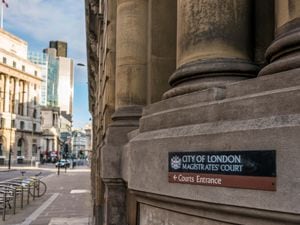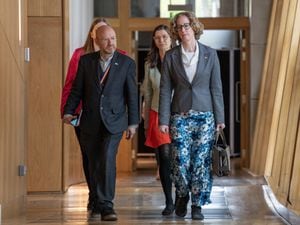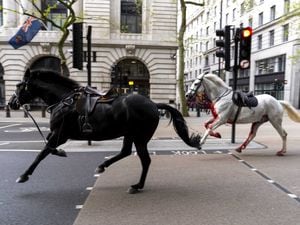MSPs vote to pass Scottish Government’s tax rate plans
Minister for Public Finance Kate Forbes described the tax rates plan as ‘progessive’ and said it would raise money for public investment.

MSPs have passed the Scottish Government’s proposals on income tax rates for the coming financial year by 61 votes to 52.
It means there will be a freeze on the higher rate of income tax at 41% for those earning between £43,430 and £150,00 per year.
For those earning above £150,000, the top rate of tax will also be frozen at 46%.
In the rest of the UK, the higher tax rate threshold is to rise to £50,000 from April.
An intermediate rate of 21% will apply for those earning over £24,944 and up to £43,430.
A basic rate of tax will apply of 20% for earnings over £14,549 to £24,944, while a starter rate of tax of 19% for income between £12,500 to £14,549 was also agreed.
Speaking at the Scottish Parliament on Tuesday, Public Finance Minister Kate Forbes said that the rates plan would raise £11.5 billion to help boost the economy and provide investment for public services.
Ms Forbes said: “This is our opportunity to show our commitment to fund essential public services, to invest in our economy and to care for those most in need.
“In the Scottish Budget, we have taken responsible decisions to ensure that Scottish income tax is progressive and raises the revenue needed to support essential public services and the economy.
“It does so in the context of continuing UK austerity and against a backdrop of a UK Government careening towards Brexit at any cost, at the cost of our economy, at the cost of free movement of skills and talent and at the cost of our public finances.
“And in sharp contrast to the chaos and the uncertainty of the UK Government, the Scottish Government will keep on delivering good governance for Scotland”.
Ms Forbes said that the tax proposals passed the four tests set out by the Scottish Government in 2017 – to protect the lowest paid taxpayers, improve progressivity, raise additional revenue to maintain and promote Scottish public services, and support the Scottish economy.
The minister also indicated that the rates would help to protect lower and middle income tax payers and suggested that 55% of Scottish taxpayers would continue to pay less than they would in the rest of the UK.
The Scottish Conservatives voiced their opposition to the rates resolution, with the party’s finance spokesman Murdo Fraser accusing the SNP of breaking promises to freeze the basic rate of income tax.
Mr Fraser said: “We do not believe it is fair to burden hard working Scots with yet more taxes, to widen the income tax gap between Scotland and the rest of the UK.
“The block grant from Westminster is increasing in real terms for 2019/20 by some £521 million, according to SPICe.
“The Scottish Conservatives would have been delighted to have sat down with the SNP Government and delivered a tax policy for Scotland that was about growing the economy and growing tax revenues, but they’re more interested in talking to their friends in the Green Party than they were in having constructive discussion with us.
“It didn’t take long for these promises that were made to be broken. Thanks to these tax changes, everyone in Scotland earning over £26,990 a year, will pay more in tax than they will pay in the rest of the UK.
“And that is not the rich, these are not the wealthy people in society, these are ordinary, hard working families – some with a household income of just £27,000 who are being penalised by the SNP”.
Scottish Labour also indicated that they would not support the rates resolution, urging the Scottish Government to go further on its taxes on higher earners.
MSP James Kelly said: “We don’t favour giving tax cuts to chief executives while penalising councils and forcing them to make service cuts.
“It’s simply unfair that high earners on six-figure salaries will pay less tax while councils face the prospect of having to make workers redundant.
“The reality is the SNP Government have made a choice here, to introduce a tax cuts budget that will favour 99% of taxpayers but at the same time continuing to penalise local councils and lacking the ambition to tackle child poverty.”
Scottish Greens co-convener Patrick Harvie indicated that his party would abstain on the vote – which allowed the resolution to pass.
Mr Harvie said that the Greens were not willing to “put at risk” the wider amendments that his party had made to the budget.
The Glasgow MSP said: “I see a rates resolution which, while it is certainly not perfect, is a great-deal better than I think James Kelly gave it credit for.
“The tax gap that the Conservatives are concerned about and the tax cuts at the top end that Labour Party are concerned about – and that I oppose as well – are the result of UK policies.
“I wish the Scottish Government was going further, to boost the budget further and further decrease inequality.
“But I will abstain to allow this rate resolution to go through and will continue to make the case for a wider context of creative, innovative approaches to taxation – on wealth as well as income, consumption as well as production and at national as well as local level.”





